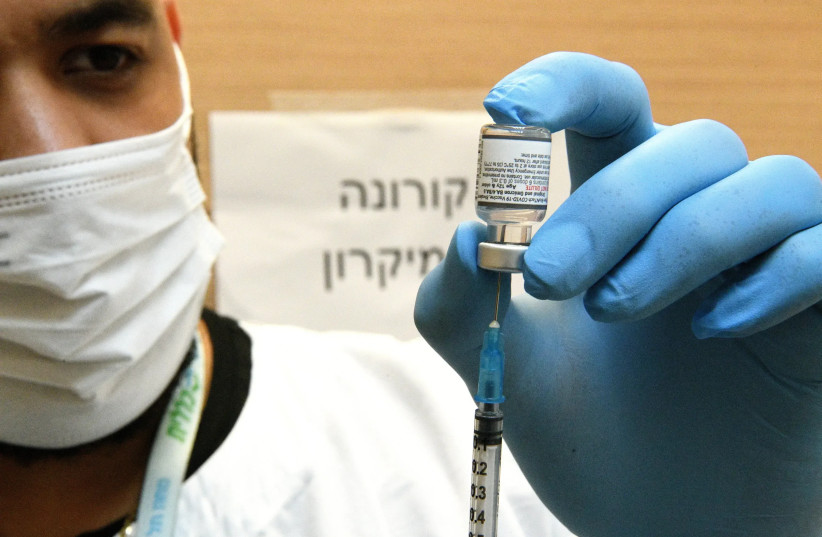During the COVID-19 pandemic, ethicists debated two critical dilemmas.
First, can we administer to very ill patients experimental therapies that have not been tested properly against the virus?
Second, can we test new vaccines through “human challenge” studies in which low-risk patients (e.g., young and healthy) are purposely exposed to the virus? Both questions relate to the propriety of testing new treatments on humans.
The Halacha of medical experimentation
Generally, Halacha permits only medical interventions whose efficacy has been proven. Yet even with tested treatments, one cannot be sure that the intervention will succeed. All interventions (e.g., surgeries) come with risks, including complications that might cause the patient to die immediately. This raises the dilemma of whether we may perform interventions that can bring long-term healing (hayei olam, indefinite life) but risk the limited time (hayei sha’ah, fleeting life) that would have remained with no intervention.
We need to ask: How likely will the intervention succeed, and how much might it help? What are the extents of the risks? Does the patient want to take the chance?

Early in the pandemic, hospitals dealt with sick patients whose prognosis seemed dire unless something would be done. The proposed treatments were reasonable but not sufficiently tested. Recovery or death were possible outcomes, along with other possibilities. Could the experimental treatment be performed?
Jewish law takes every moment of life seriously. For this reason, we command people to violate Shabbat in an emergency, even if the action may extend life for only a limited amount of time. We also may not hasten someone’s death, even if he or she has only a very short time to live. Nonetheless, the Talmud asserts that patients can take serious risks to heal themselves.
In the particular case, it was dealing with a nefarious doctor who might heal a gravely ill patient but might also furtively kill him. With no alternative, the Talmud rules that the patient may turn to this doctor, despite the risks.
We thus allow risky interventions when we fear that the patient’s life expectancy is very limited. For halachic purposes, this usually means a terminal prognosis of up to 12 months. Many hospitalized COVID patients were therefore justifiably given experimental treatment protocols that could, and frequently did, save them.
In other circumstances, patients (or their agents) may elect not to receive dangerous interventions if they remain unconvinced that the potential benefits are sufficient given the risks. Some decisors try to quantify these probabilities. Must there be at least a 50% chance of success? Or do we allow even higher levels of risk to potentially save them?
It’s frequently hard to give a firm percentage. We weigh the estimated probabilities of potential upsides with the chances of harmful effects based on the best medical advice. Then, Rabbi Moshe Feinstein asserted, Jewish law allows endangered patients to make the best choices they can in the face of grave uncertainties.
Rabbi Shlomo Zalman Auerbach added that we might permit a patient to choose a risky experimental treatment to potentially heal a very painful ailment, even if the condition is not terminal. Rabbi Shlomo Braun went further to assert that a person may endanger himself to treat any significant nonterminal illness, independent of the factor of pain.
Others, like Rabbi Shlomo Goren and Rabbi Moshe Sternbuch, indicate that high levels of risk-taking would not be permitted for non-terminal diseases. It’s difficult to give clear-cut rules in these circumstances. As always, each case must be examined on an individual basis.
TRIALS REGARDING vaccines address a different dilemma.
After two initial stages of very limited testing for basic safety and efficacy, clinical trials for vaccines are usually done through field studies. Thousands of patients are randomly given an experimental vaccine or a placebo. Researchers compare the incidence of disease between the vaccinated and unvaccinated. However, it takes a long time to allow for eventual exposure to the virus before a meaningful comparison can be made between the groups.
During the pandemic, some ethicists proposed human challenge studies in which trial participants would be purposely exposed to the virus. This would significantly curtail the time necessary to get meaningful statistics, but it would purposely infect people with a potentially dangerous virus. Is such altruistic volunteerism permitted?
As Rabbi Shlomo Goren noted, such human experimentation raises questions of how much individuals may be expected to sacrifice themselves for the collective welfare. In cases of terminally ill patients, they may potentially benefit from the experimentation, along with the accrued scientific wisdom learned from these cases.
In cases of vaccine trials, however, the volunteer may never be exposed to the virus, let alone become sick from it. Nonetheless, Rabbi Auerbach compared such cases to a war in which citizens endanger themselves to protect society. So, too, he argued, it is possible that we may mandate people to undergo vaccine experimentation to prevent mass medical casualties.
As Rabbi Asher Weiss noted during the pandemic, the parallel between battling a pandemic and an army is not clear. Both entail the endangerment of public welfare, but warfare is a distinct type of threat. Moreover, it’s hard to imagine that we’d compel citizens to undergo experimental trials much as we conscript soldiers.
Nonetheless, both Rabbi Weiss and bioethicist Rabbi Avraham Steinberg permitted the use of human challenge studies when the volunteers were relatively young and generally healthy. Given the minimal health risks to the participants, as well as their close monitoring, they deemed this altruism as meritorious and possibly the fulfillment of a mitzvah.
In the end, human challenge studies weren’t necessary, since the pandemic was so widespread that investigators were able to quickly obtain a significant sample size. The precedent rulings, however, might become relevant on future occasions. ■
The author is the executive director of Ematai, an organization dedicated to helping Jews navigate dilemmas regarding aging, end-of-life care, and organ donation. www.ematai.org
